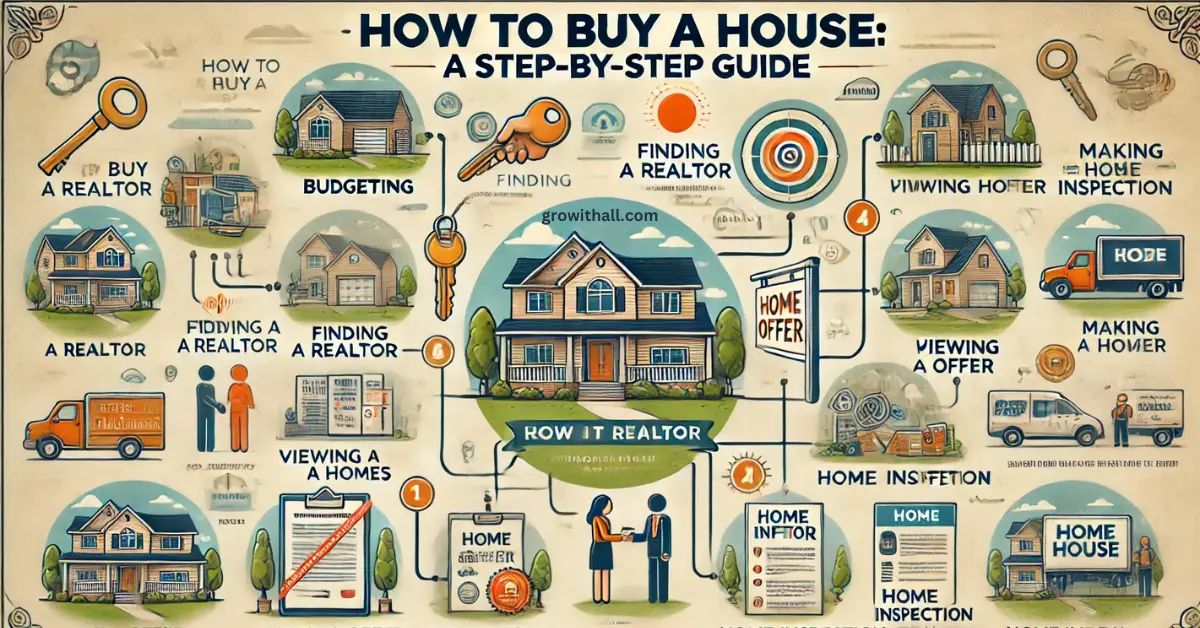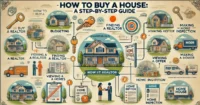Introduction: Why Buying a House is a Big Decision
Buying a house is more than just purchasing a place to live; it is a long-term financial commitment that requires careful thought and planning. Unlike renting, where you have the flexibility to move after a lease ends, owning a home ties you to a specific location and comes with duties such as maintenance, repairs, and property taxes. Because of this, it’s essential to approach homeownership with a long-term perspective, ensuring that you’re financially and emotionally prepared to take on this commitment.
The decision to buy a house should not be taken lightly. Owning a home can provide a sense of stability and financial security, but it also comes with risks, such as fluctuating property values and unforeseen expenses for repairs. Moreover, it represents a significant portion of your savings and income. For many people, it’s the biggest purchase they’ll ever make. Therefore, understanding the steps involved and making informed decisions at each stage can help you avoid costly mistakes and ensure that the home you buy meets your needs both now and in the future.
1. Understand Your Financial Situation
Before you start searching for homes or even dreaming about your ideal house, it’s crucial first to take a close look at your financial situation. This will give you a realistic understanding of what you can afford and whether buying a house is feasible at this point in your life. Many people get excited about the idea of owning a home but overlook the complexities of financial planning that come with it. By analyzing your finances early, you’ll be better prepared for the rest of the home-buying process.
Check Your Credit Score
Your credit score is one of the numerous important elements lenders will consider when determining whether to approve you for a mortgage and what interest rates you will be offered. The higher your credit score digit, the lower the interest rates you’ll likely qualify for, which can save you thousands of bucks over the life of your mortgage. A good credit score also shows lenders that you are responsible for your debts and can manage monthly payments consistently.
If your credit score is low, don’t worry; there are steps you can take to improve it. Start by reviewing your credit report, which you can get for free from major credit bureaus like Experian, Equifax, or TransUnion. Look for any errors or issues that may be affecting your score, such as unpaid debts, late payments, or incorrect information. Paying down existing debt, making on-time payments, and reducing credit card balances can all help raise your score over time. Improving your credit score should be important before applying for a mortgage.
Assess Your Savings
In addition to reviewing your credit score, you need to evaluate your savings. Buying a house needs more than just a down payment. There are also closing costs, moving expenses, and potential repairs or upgrades that may need to be done once you’ve moved in. Experts often recommend having three to six months of living costs saved up in an emergency fund before purchasing a home. This safety net will help cover any unexpected costs that arise after you move in.
Your down payment is another critical part of the equation. While some loans allow for a down payment as low as 3%, most conventional mortgages require a down payment of around 20%. Having a higher down payment not only reduces the amount you need to borrow but also helps you avoid spending private mortgage insurance (PMI), which is an extra charge added to your monthly mortgage expense if your down payment is less than 20%.
Determine Your Budget
Once you’ve assessed your credit score and savings, the next step is to determine how much house you can actually afford. This involves looking at your monthly income, expenses, and debts. A common rule of thumb is to pay no over than 30% of your monthly income on housing costs, which include your mortgage payment, property taxes, and homeowners insurance. By sticking to this guideline, you ensure that you don’t become “house poor,” meaning you don’t spend so much on your home that you can’t afford other necessary expenses.
In addition to considering your monthly payments, you’ll also want to factor in the long-term costs of owning a home, such as maintenance, repairs, and utilities. Homes require ongoing investment to keep them in good shape, and these expenses can add up over time. By budgeting conservatively and leaving room for unexpected costs, you’ll be in a better position to enjoy homeownership without financial stress.
2. Get Pre-Approved for a Mortgage
Once you’ve assessed your finances and determined that you’re ready to buy a house, the next step is to get pre-approved for a mortgage. Pre-approval is an essential part of the home-buying process because it gives you a clear idea of how much you can borrow, which will help guide your home search. It also signals to sellers that you’re a serious customer, which can give you an edge in competitive markets.
What is Mortgage Pre-Approval?
Mortgage pre-approval is a procedure where a lender reviews your financial details, including your income, credit score, and debts, to determine how much money they are willing to lend you for a home purchase. Pre-approval is not the same as final loan approval, but it provides a good estimate of the amount you can borrow and the interest rate you’ll likely receive. Keep in mind that pre-approval is typically valid for 60 to 90 days, so if you don’t find a home within that time, you may need to reapply.
Getting pre-approved for a mortgage is important because it helps you set realistic expectations for your home search. Without pre-approval, you might fall in love with a home only to find out later that you can’t afford it. Pre-approval also speeds up the buying process once you do find a home because you’ve already done much of the paperwork required for the mortgage.
Documents Needed for Pre-Approval
To get pre-approved for a mortgage, you’ll need to supply the lender with various financial documents that prove your income, debts, and employment status. These documents typically include:
- Pay stubs for the last few months to verify your income
- Tax returns and W-2 forms for the last two years
- Bank statements to show your savings and financial stability
- Information on any overdue debts, such as credit card balances or student loans
- Employment verification, like a letter from your employer or recent promotions
Providing accurate and comprehensive documentation is essential for a smooth pre-approval process. The lender will use this information to assess your financial health and determine how much risk they’re willing to take by lending to you. If you’re self-employed, the process may be slightly more complex, as you’ll need to provide additional documentation to prove your income stability.
How Long Does Pre-Approval Last?
Mortgage pre-approval usually lasts for 60 to 90 days, depending on the lender. During this time, the lender guarantees the loan amount and the interest rate they’ve offered, assuming your financial situation doesn’t change significantly. If your pre-approval expires before you find a home, you can reapply, but you’ll need to provide updated financial documents to reflect any changes in your income, debts, or savings.
It’s important to maintain stable finances during the pre-approval period. Avoid making large purchases, taking on new debt, or changing jobs, as these actions could affect your pre-approval status and make it harder to secure a loan later on. Once you’re pre-approved, you can confidently begin your home search, knowing that you have the financial backing to make an offer when the right property comes along.
3. Decide What You Want in a Home
Now that you’ve got your finances in order and are pre-approved for a mortgage, it’s time to think about what you’re looking for in a home. This is one of the most exciting parts of the home-buying process, but it can also be overwhelming. With so many options available, it’s important to be clear about your priorities and what you need versus what you want in a home.
Choose the Right Location
Location is arguably the most important element to consider when buying a home. The location of your house will affect your daily life, your commute to work, your children’s schooling, and even the future value of the property. A home in a good location can be a great investment, as property values in desirable areas tend to rise over time.
When choosing a location, think about the factors that are most important to you. Do you want to live in a quiet suburb, a bustling city, or somewhere in between? How close do you need to be to your job, schools, shopping, or public transportation? If you have children or plan to in the future, the quality of local schools will be a major consideration. You’ll also want to think about the overall safety and vibe of the neighborhood. Taking the time to research and visit different areas can help you find the perfect spot.
Identify Must-Have Features
Once you’ve narrowed down the location, it’s time to think about the specific features you want in a home. Start by making a list of your non-negotiables or must-have features. These are the things that you absolutely need in a home to meet your family’s needs. For example, you may need a certain number of bedrooms, a specific amount of square footage, or a garage for parking.
Other features may be more flexible and can be considered “nice-to-haves.” These might include things like a large backyard, a modern kitchen, or a swimming pool. While it’s fun to dream about your ideal home, it’s important to be realistic about what you can afford. Some of the more luxurious features may not be within your budget, so prioritize the things that will have the biggest impact on your day-to-day living.
Prioritize Your Needs vs. Wants
After you’ve identified your must-have features, take a moment to consider what you want versus what you need. It’s easy to get caught up in the excitement of house hunting and fall in love with homes that have all the bells and whistles. However, it’s important to remember that your budget may not allow for every luxury.
One helpful approach is to make a list of your needs and wants and then rank them in order of importance. For example, a home with three bedrooms might be a necessity if you have a growing family, while a home with a fireplace or a home office might be a nice bonus but not essential. By clearly defining your priorities, you’ll be better equipped to make a decision when you find a home that checks most of the boxes but may require some compromises.
4. Find a Real Estate Agent
Navigating the home-buying procedure can be challenging, especially if you’re unfamiliar with real estate transactions. This is where a real estate agent comes in. A good agent can make the process smoother and less stressful by guiding you through each step, from searching for homes to negotiating with sellers.
Why You Need a Real Estate Agent
A real estate agent is a licensed professional who specializes in helping buyers and sellers navigate the real estate market. For buyers, an agent’s primary role is to help you find homes that meet your criteria, schedule viewings, negotiate with sellers on your behalf, and guide you through the legal and financial paperwork involved in purchasing a home. Agents also have access to listings that may not be available to the general public and can provide valuable insights about neighborhoods, market trends, and property values.
Having a real estate agent on your side can make a big difference, especially in a competitive market where homes may receive multiple offers. An experienced agent knows how to structure your offer to make it more appealing to the seller, which can give you an advantage over other buyers. Additionally, they can help you guide any issues that arise during the inspection or closing process.
How to Find the Right Agent
Discovering the right real estate agent is crucial to a successful home-buying experience. You’ll want to work with someone knowledgeable, experienced, and easy to communicate with. There are several ways to find a reputable agent:
- Ask for recommendations from friends, relatives, or colleagues who have newly bought or sold a home. Personal referrals are often the best way to find an agent you can trust.
- Research online by reading reviews and checking the agent’s website or social media profiles. Many real estate agents have online reviews from previous clients, which can give you a sense of their professionalism and expertise.
- Interview multiple agents before making a decision. Don’t be afraid to ask questions about their experience, knowledge of the local market, and availability. You’ll want to choose someone who is responsive, proactive, and has a deep understanding of the area where you’re looking to buy.
Once you’ve found an agent you’re comfortable with, they will help you set up viewings, keep track of new listings that meet your criteria, and provide advice on making offers. It’s important to have a good working relationship with your agent, as they will be your guide throughout the home-buying process.
5. Start House Hunting
With your finances in order, a pre-approval letter in writing, and a real estate agent by your side, it’s time for the exciting part: house hunting. This is where all your planning and preparation come together as you start searching for your dream home.
Using Online Platforms
One of the easiest ways to start your home search is by using online platforms. Websites like Zillow, Realtor.com, and Redfin allow you to browse thousands of listings from the comfort of your home. These sites offer various filters that let you narrow your search based on measures such as price, location, number of bedrooms, square footage, and more. Many listings also include photos, virtual tours, and detailed descriptions of the property’s features.
While online platforms are a great starting point, it’s important to remember that not every home will be listed online, and the information may not always be up to date. That’s where your real estate agent comes in handy. They can provide you with access to the Multiple Listing Service (MLS), a database used by real estate professionals that contains the most up-to-date and comprehensive listings.
Visiting Open Houses
In addition to browsing homes online, you’ll want to attend open houses and plan private showings with your agent. Open houses are a great way to see multiple homes in a short period and get a feel for what’s available in your price range. It’s also an opportunity to explore different neighborhoods and see how the homes are laid out in person, which can give you a better sense of the space than photos alone.
When attending open houses, take notes and photos so you can remember the details of each home later. Pay attention to things like the overall condition of the property, the size of the rooms, and how well the home’s layout fits your needs. Don’t be afraid to ask questions about the age of the roof, the condition of major systems (such as HVAC and plumbing), and any recent renovations or upgrades.
What to Look for During House Tours
As you tour potential homes, it’s important to look for both the big picture and the small details. Start by considering the home’s overall condition and whether it meets your basic requirements, such as the number of bedrooms, bathrooms, and square footage. Also, think about how the home’s layout will fit your lifestyle. For example, does the kitchen have enough space for cooking and entertaining? Are the bedrooms located in a quiet area of the house?
In addition to the layout, be sure to check for any signals of wear and tear that could indicate bigger problems down the road. Look for cracks in the walls or ceilings, water stains, mold, or evidence of pests. Pay attention to the age of the roof, windows, and appliances, as these can be expensive to replace. A well-maintained home will generally require fewer repairs and updates, saving you time and money after you move in.
6. Make an Offer
After all the research, budgeting, and house hunting, you’ve finally found a house that you want to call home. Now, it’s time to make an offer. This step can be exciting and nerve-wracking because there’s always the chance that another buyer may also be interested in the same property. However, making a smart and well-planned offer can significantly improve your chances of securing the home.
How to Make an Offer
When you decide to make an offer on a house, your real estate agent will guide you through the process. The offer is a formal document that outlines the cost you are ready to pay, along with any other conditions or contingencies that you want to include. Contingencies are clauses that allow you to back out of the deal under certain conditions, such as if the home inspection reveals major problems or if your financing falls through.
Your real estate agent will help you determine the right offer price based on the current market, the condition of the home, and how long it’s been on the market. If the house is in a competitive area or has multiple offers, you may need to offer more than the asking price to stand out. However, if the market is slow or the house has been listed for a while, there may be room to negotiate a lower price.
Once you’ve settled on an offer, your agent will submit it to the seller, who can accept, reject, or counter your offer with different terms. In most cases, some back-and-forth negotiation takes place before both parties agree on a final price and terms.
Negotiating with the Seller
Negotiation is a normal part of the home-buying process, and having a skilled real estate agent can make a big difference in the outcome. Your agent will arrange on your behalf to get you the best possible deal while also ensuring that the request is attractive to the seller.
During negotiations, you may need to adjust your offer based on the seller’s feedback. For example, if the seller obtains multiple offers, they may ask for a higher price or request that certain contingencies be removed. You might also negotiate things like closing costs, repairs, or upgrades to the property. It’s important to remain flexible and open to compromise while staying within your budget and making sure you’re comfortable with the final terms.
If the seller accepts your offer, you’ll move forward to the next steps, such as scheduling a home inspection and finalizing your financing. If the dealer counters or rejects your offer, you’ll need to decide whether to adjust your offer or continue looking for other homes.
What Happens After the Offer is Accepted?
Once the seller receives your offer, the home goes into escrow, a process where a third party holds onto funds and documents until all conditions of the sale are met. At this point, you’ll need to put down a deposit called “earnest money,” which is typically 1-3% of the purchase price. This deposit offers the seller that you are serious about purchasing the house, and it will be involved in your down payment or closing costs once the sale is finalized.
During the escrow period, you’ll complete several important steps, including scheduling a home inspection, securing your mortgage, and preparing for closing. You’ll also need to review the purchase agreement carefully to ensure that all conditions and contingencies are met. If any issues arise during this time, such as problems with the home inspection or delays in securing financing, you’ll have the opportunity to address them before moving ahead with the sale.
7. Get a Home Inspection
A home inspection is a critical part of the home-buying process, and it’s one step you should never skip. Even if the house looks perfect on the surface, there could be hidden problems that only a professional inspector can identify. A thorough examination can save you from buying a home with costly issues and give you peace of mind that the property is in good condition.
Importance of Home Inspections
A home inspection involves hiring a professional inspector to evaluate the overall condition of the house, including its structure, systems, and major components like the roof, plumbing, and electrical systems. The purpose of the inspection is to uncover any existing or potential problems that could affect the safety, functionality, or value of the home.
The inspection will provide you with a detailed report that outlines any issues found and recommends repairs or further evaluations. This report is a valuable tool that can help you make informed decisions about whether to move forward with the purchase, request repairs from the seller, or even back out of the deal if major problems are discovered.
In many cases, buyers include a home review contingency in their offer, which permits them to negotiate repairs or request an expense reduction if significant issues are found. If the seller refuses to make repairs or lower the price, you may have the option to cancel the agreement without losing your earnest money.
What Home Inspectors Look For
A home inspector will examine various aspects of the property, including:
- Structural Integrity: The inspector will inspect the foundation, walls, ceiling, and attic for any signs of structural damage, such as cracks, leaks, or uneven settling.
- Roof and Exterior: The state of the roof is especially important, as a damaged or aging roof can lead to water leaks and expensive repairs. The inspector will also inspect the siding, windows, doors, and any exterior features like decks or patios.
- Electrical and Plumbing Systems: Faulty wiring or outdated plumbing can pose safety hazards and lead to expensive repairs. The inspector will inspect the electrical panel, outlets, switches, water lines, drains, and water heater to ensure everything is in good working order.
- Heating, Ventilation, and Air Conditioning (HVAC): The HVAC system is essential for maintaining a comfortable living environment, so the inspector will evaluate the furnace, air conditioner, and ventilation system to ensure they’re functioning properly.
- Pest and Mold Issues: The presence of pests, such as termites or rodents, or mold growth can indicate underlying matters that need to be addressed. The inspector will look for indications of infestations or water issues that could lead to mold.
While no house is perfect, the inspection helps you understand what issues may need immediate attention and what repairs might be needed in the future. Depending on the findings, you can use the inspection report to bargain with the seller for repairs or a price reduction.
8. Secure Your Financing
After your offer is accepted and the home inspection is complete, the next step is to secure your mortgage and finalize the financing. Even though you were pre-approved for a mortgage earlier in the process, the final approval involves a more complex review of your financial situation and the property itself. It’s important to stay on top of the process and provide any additional documentation your lender may require.
Finalizing Your Mortgage
Your lender will begin the process of finalizing your mortgage by verifying all of the information you provided during the pre-approval stage, including your income, employment, credit score, and financial assets. The lender will also need an appraisal of the home to ensure that its value matches the purchase price. This protects the lender by ensuring they aren’t lending you more money than the property is worth.
Once the appraisal is complete and all documentation is in order, the lender will issue a final approval for the loan, known as a “clear to close.” At this point, you’ll lock in your interest rate and receive a closing disclosure, which outlines the terms of your loan, the monthly fee, and the total closing costs.
The Importance of Interest Rates
The interest rate on your mortgage is one of the most important factors in determining the overall cost of your loan. Even a small difference in interest rates can significantly impact your monthly cost and the full amount you’ll pay over the life of the loan. That’s why it’s essential to compare offers from different lenders and consider whether to lock in a fixed or adjustable-rate mortgage.
A fixed-rate mortgage delivers stability, as your interest rate and monthly pay will stay the same throughout the life of the loan. This is a popular option for buyers who plan to stay in their homes for many years. On the other hand, an adjustable-rate mortgage (ARM) starts with a lower interest rate but can change over time, which may be a better fit for buyers who plan to sell or refinance before the rate adjusts.
9. Closing the Deal
Closing is the final step in the home-buying process, and it’s when the ownership of the property is officially transmitted from the seller to you. This is an exciting moment, but it also involves signing a lot of paperwork and spending the remaining costs associated with the purchase. Understanding what to expect at closing can help ensure that everything goes smoothly.
What Happens at Closing?
At the closing, you’ll meet with the seller, your real estate broker, a representative from the title company, and possibly your lender. During this meeting, you’ll sign a variety of documents, including the loan agreement, the deed, and other legal paperwork. You’ll also pay any remaining closing costs and fees.
Closing costs typically include:
- Loan origination fees: These are fees levied by the lender for processing your mortgage application.
- Appraisal and inspection fees: These cover the cost of the home appraisal and inspection, both of which the lender requires.
- Title insurance: This covers you and the lender against any legal arguments over the ownership of the property.
- Property taxes and homeowners insurance: You must prepay a portion of your property taxes and insurance at the closing.
- Attorney fees (if applicable): In some states, an attorney is required to oversee the closing process, and their fees will be included in the closing costs.
You should receive a closing disclosure before the closing that outlines all of the transaction’s fees and costs. Review this paper carefully to ensure that everything is accurate.
Costs Involved in Closing
Closing fees generally range from 2-5% of the home’s purchase price, so it’s important to budget for these expenses ahead of time. For example, if you’re buying a $300,000 home, your closing costs could vary from $6,000 to $15,000. These costs are in addition to your down payment, so make sure you have enough funds set aside to cover both.
Some buyers may be able to negotiate with the seller to protect a portion of the closing costs, especially in a buyer’s market where sellers are more willing to make concessions. Your real estate agent can help you determine whether it’s possible to negotiate these costs based on the current market conditions.
Signing the Final Paperwork
Once all the documents are signed and the necessary payments have been made, you’ll receive the keys to your new home. Congratulations—you are now a homeowner! The closing process can be overwhelming, but it’s the final step before you can move into your new house and start enjoying your new investment.
10. Moving In
With the keys in hand and the closing behind you, it’s time to move into your new home. Moving can be tempting and stressful, but with proper planning, you can complete the transition as smoothly as possible.
Planning the Move
Start by organizing your move well in advance. Whether you’re hiring professional movers or doing it yourself, you’ll need to coordinate the logistics of transporting your belongings from your old home to your new one. If you’re moving long-distance, book a moving company early to ensure availability. For local moves, you may be able to handle it yourself with the help of friends and family, but renting a truck can make the process easier.
As you prepare for the move, make a checklist of tasks to complete, such as:
- Packing up your belongings in labeled boxes to make unpacking easier
- Notifying utility companies of your move so that services like electricity, water, and gas are ready when you move in
- Forwarding your mail to the post office and updating your address with important institutions, such as your bank, employer, and insurance provider
Planning and staying organized will help ensure that moving day goes as smoothly as possible.
Changing Your Address
Don’t forget to change your address with all the necessary entities. In addition to the post office, you’ll need to update your address with:
- Your bank and credit card companies
- Your employer for tax and payroll purposes
- The Department of Motor Vehicles for your driver’s license and vehicle registration
- Subscription services, such as magazines or meal delivery services
Taking care of these facts in advance will help ensure that everything important gets noticed in the mail and that your services are set up correctly when you move in.
FAQs About Buying a House
How long does the home-buying process take?
The timeline for buying a home can change depending on several factors, including how quickly you find a home, the local market conditions, and how long it takes to secure financing. On average, the procedure takes 30 to 60 days from the time you make an offer to closing, but it can take longer if there are delays with inspections, appraisals, or loan approval.
Do I need a real estate agent to buy a house?
While you’re not legally required to have a real estate agent, it’s highly recommended, especially for first-time buyers. An agent can help you guide the complex process, negotiate with sellers, and ensure that all paperwork is in order. They also have access to listings and market insights that can be priceless during your search.
What is a down payment, and how much do I need?
A down payment is the amount of money you pay upfront when purchasing a home. The required amount varies depending on the type of mortgage you choose, but most conventional loans require a down payment of at least 3-20% of the purchase price. A greater down payment can help you secure more useful loan terms and avoid private mortgage insurance (PMI).
What if the home inspection reveals problems?
If the home inspection reveals important issues, you can deal with the seller to make repairs or lower the price. If the problems are severe, you may have the option to back out of the deal altogether. It’s important to include a home inspection contingency in your offer to protect yourself from purchasing a home with hidden defects.
Can I buy a home with bad credit?
It’s possible to buy a house with bad credit, but it may be more challenging. You’ll likely face higher interest rates and may need to make a larger down payment. Improving your credit score just before applying for a mortgage can assist you qualify for better loan duration and saving money in the long run.













